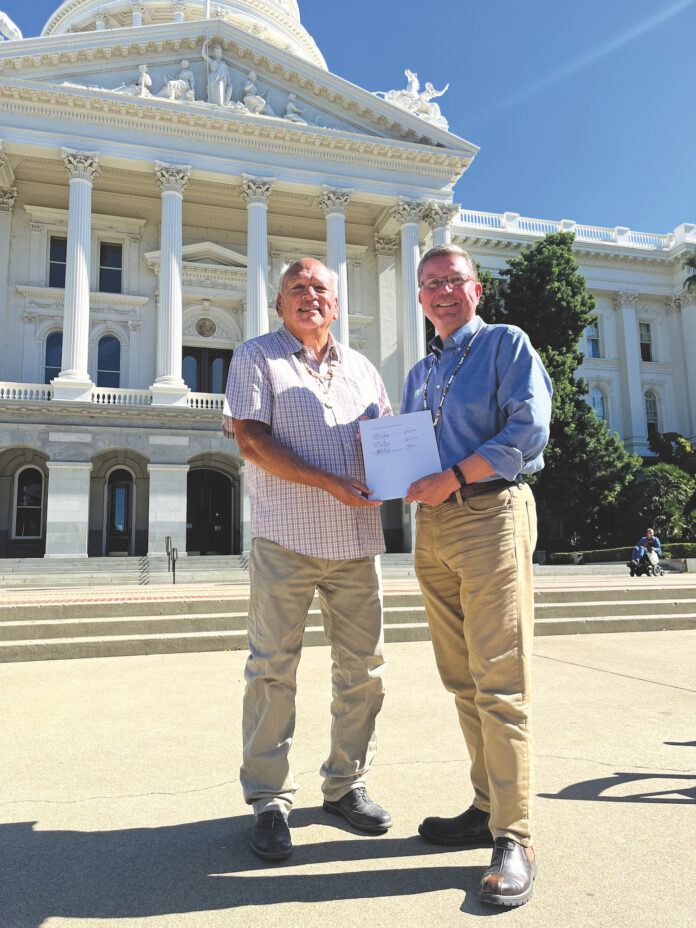
The Amah Mutsun Tribal Band and its affiliated Amah Mutsun Land Trust have entered into a historic partnership with the Trust for Public Land to protect indigenous lands and natural resources on the Central Coast. The joint announcement was made on Oct. 12 by the Trust for Public Land and the Amah Mutsun Tribal Band.
“This agreement represents a significant step forward in our collective efforts to conserve and protect California’s rich and diverse history and heritage,” said Guillermo Rodriguez, vice president and California state director of the Trust for Public Land. “What makes this partnership unique is the expertise all three organizations bring to conservation and climate resiliency steeped in cultural heritage and stewardship for the land.”
The partnership was signed in front of the California State Capitol in Sacramento on the same week that Indigenous People’s Day was celebrated nationwide.
Valentin Lopez, chairman of the Amah Mutsun Tribal Band and founder of the Amah Mutsun Land Trust, said in the statement that partnering with the TPL will allow the tribal band to continue its conservation and stewardship efforts.
“For too long, Indigenous voices and traditional land stewardship have been marginalized. This partnership signifies a resurgence of our cultural heritage and a powerful alliance to protect our ancestral lands,” Lopez said. “Together, we will restore the balance between humans and the environment, ensuring that the wisdom of our ancestors is passed down to those who follow.”
Lopez said that what this means in practice is getting his group access to the TPL’s vast resources to boost the leadership skills of tribal members that sit on the board of the Amah Mutsun Land Trust.
“Our goal is to have all the [land trust] staff be tribal members and most all of the board members be tribal members. We would like it to be as tribally-led as possible,” Lopez told this newspaper. “But our members don’t have the expertise to predict success in managing a land trust at this time. And we want to develop expertise in this area.”
The Amah Mutsun Land Trust was founded in 2013 to support stewardship and conservation efforts in the tribal band’s ancestral lands.The land trust runs a native stewardship conservation corps for tribal youth to learn traditional ecological practices and life skills, according to its website.
The Amah Mutsun Tribal Band claims a swath of the southern Santa Clara Valley in the Gilroy/Hollister area as the heart of their ancestral home—known as Juristac—and have voiced opposition to development projects there.
The tribal band is fighting against two proposed developments: the Sargent Quarry project in south Santa Clara County and the Betabel Road project in San Benito County.
Sargent Quarry is a proposed sand and gravel open-pit mine that would have a 30-year operating life on a roughly 320-acre site near Gilroy. For years, the Amah Mutsun have opposed it, garnering support from environmental groups who fear the adverse effects to local wildlife if the quarry moves forward.
The Betabel Road project in San Benito County is a 26-acre proposal that includes 108,425 square feet of commercial space with adjacent farm stands and an events center. The Amah Mutsun filed a lawsuit last year against the project’s developer, the McDowell Charity Trust. They claim that the project area is part of their ancestral land and that the development was approved without proper consultation with them, among other environmental concerns.
Lopez said that the partnership with the Trust for Public Land will amplify the tribal band’s efforts to safeguard their ancestral lands against developments like these.
“They can help us with acquisition of sensitive lands and take them out of the threat of development,” Lopez said. “We want to be able to continue to do research on the traditional stewardship of our ancestors and how we can restore the knowledge so we can continue in their traditional ways.”









